The 5th Belt and Road Women's Forum successfully convened in Sanya
date:2023-12-15 11:26:12 hits:
The 5th Belt and Road Women’s Forum successfully convened in Sanya
—She Power: Jointly Building and Sharing a Beautiful Life
—Women’s Exchanges and Cooperation under the Belt and Road Initiative to Enhance People-to-People Connectivity
—Women’s Exchanges and Cooperation under the Belt and Road Initiative to Enhance People-to-People Connectivity
The 5th Belt and Road Women’s Forum, themed ‘She Power: Jointly Building and Sharing a Beautiful Life,’ successfully convened in Sanya, Hainan from December 6-8. Co-hosted by the Chinese People’s Association for Friendship with Foreign Countries, the All-China Federation of Returned Overseas Chinese, and the UN Resident Coordinator Office in China, and jointly organized by the People’s Government of Sanya City, the China Friendship Foundation for Peace and Development, and the Secretariat of the Belt and Road Women’s Forum. The event attracted over 400 participants, including leaders from the Chinese People’s Association for Friendship with Foreign Countries, the All-China Federation of Returned Overseas Chinese, the All-China Youth Federation, relevant ministries and commissions, and leadership of the People’s Government of Sanya City.
Distinguished guests, including the First Lady of Guyana and representatives from the United Nations, Nobel laureates in Physiology or Medicine, and ambassadors from Kyrgyzstan, Zambia, Maldives, Nepal, Guyana, Uganda, Mozambique, and various other embassies in China, along with domestic and international business representatives, engaged in profound exchanges and discussions. They shared insights on the unique role women have played in the decade-long Belt and Road Initiative and their substantial achievements. The forum looked forward to the future of the Belt and Road Initiative, advocating for ‘She Power’ to drive the common development and prosperity of human society.
Prominent attendees, such as Li Xikui, Vice President of the Chinese People’s Association for Friendship with Foreign Countries, Cheng Hong, Vice Chairwoman of the All-China Federation of Returned Overseas Chinese, Siddharth Chatterjee, United Nations Resident Coordinator in China, and Arya Ali, First Lady of Guyana, along with Chen Xi, Mayor of the People’s Government of Sanya City, graced the opening ceremony with their presence and addresses. Chen Xi presided over the opening ceremony.
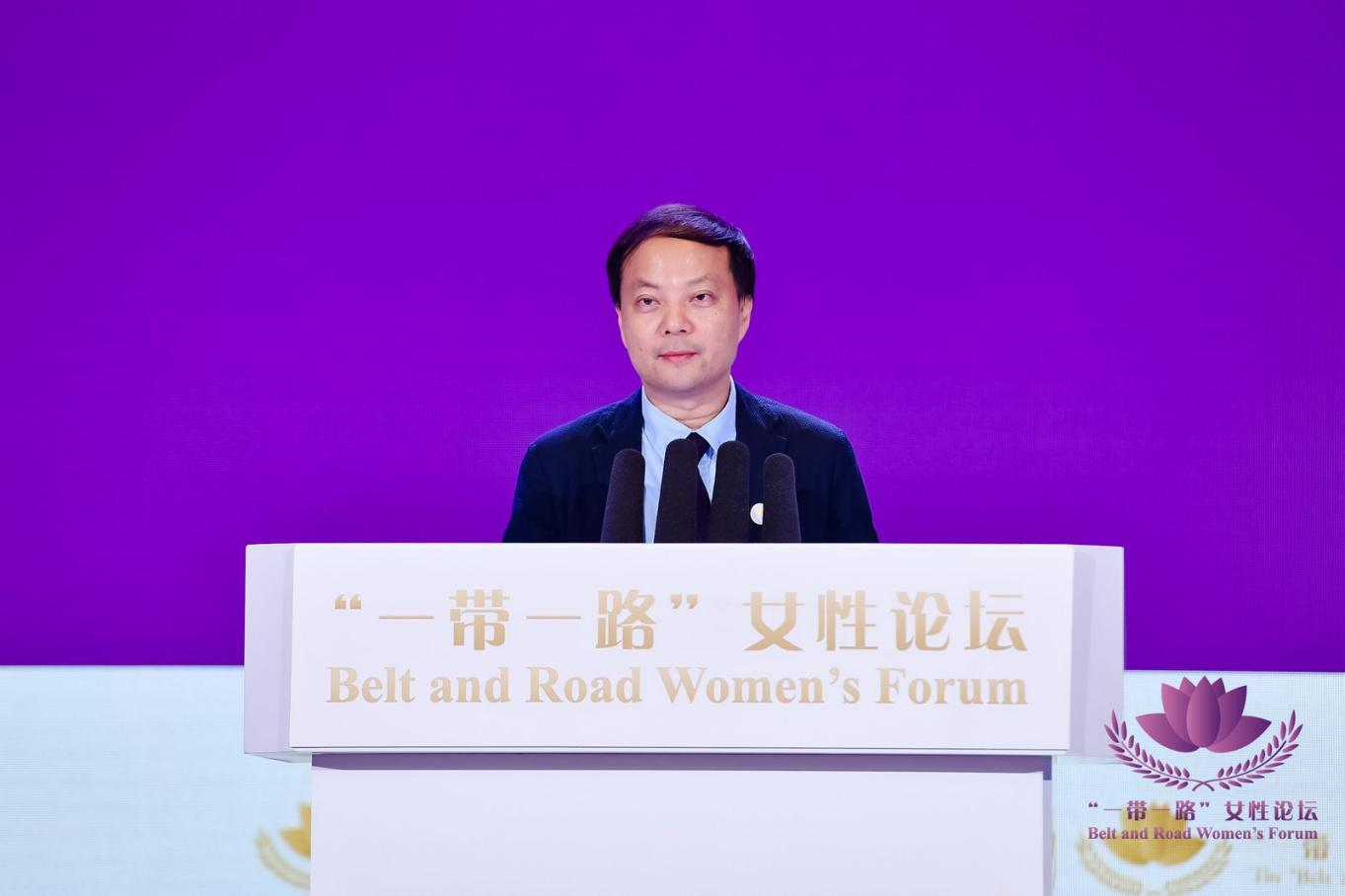
Chen Xi underscored Sanya’s role as a strategic pivot city in the 21st Century Maritime Silk Road, capitalizing on the development of the Hainan Free Trade Port to enhance connectivity and cooperation with Belt and Road countries in culture, tourism, sports, technology, and education, thereby uplifting Sanya’s modern tropical coastal city development and international collaborative projects. Chen expressed hope for the guests to contribute to Sanya’s development and global cooperation and exchange in women’s affairs, thereby enhancing global women’s welfare and building a community with a shared future for mankind.
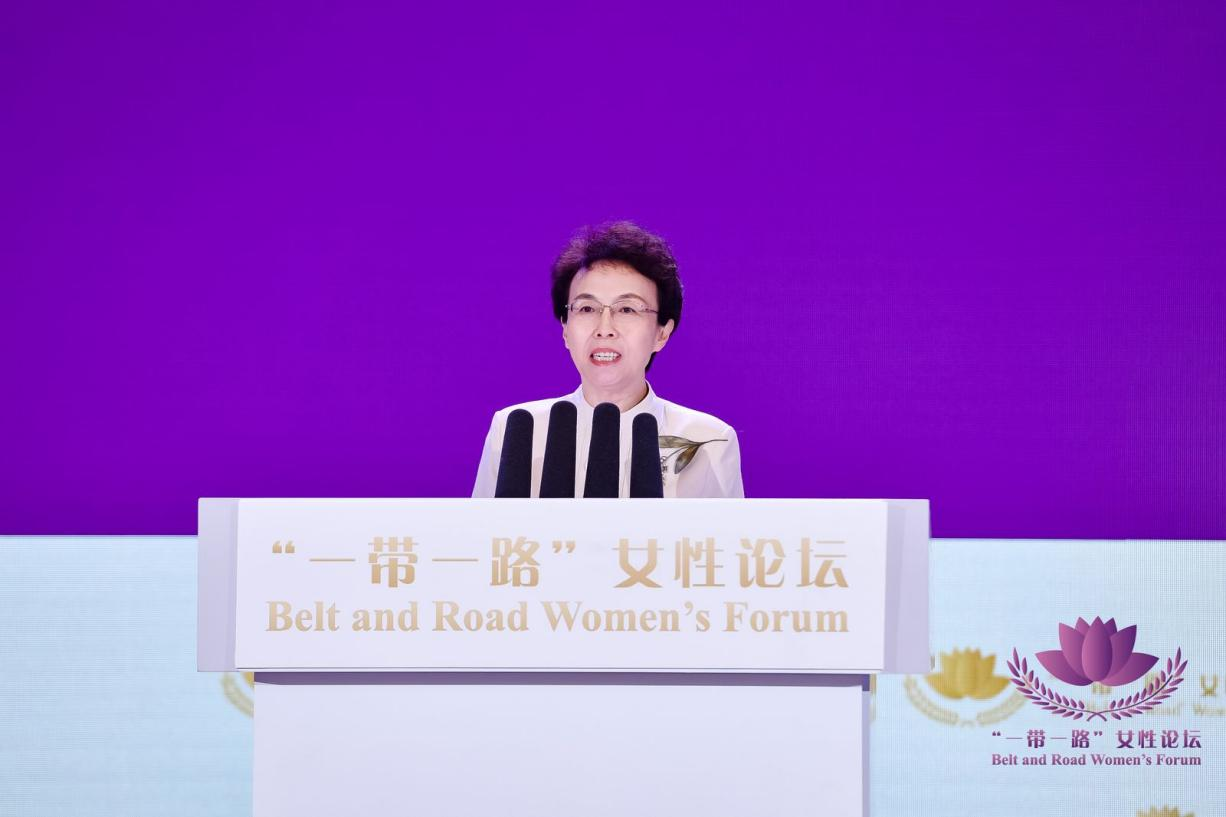
Cheng Hong encouraged active participation in the Belt and Road Initiative, highlighting the unique role of overseas Chinese women familiar with domestic and international markets and extensive political connections. She advocated for integrating into eight actions, actively engaging in e-commerce cooperation, green development, and digital trade, thus contributing to the global movement of resources and injecting ‘She Power’ into the high-quality construction of the Belt and Road.
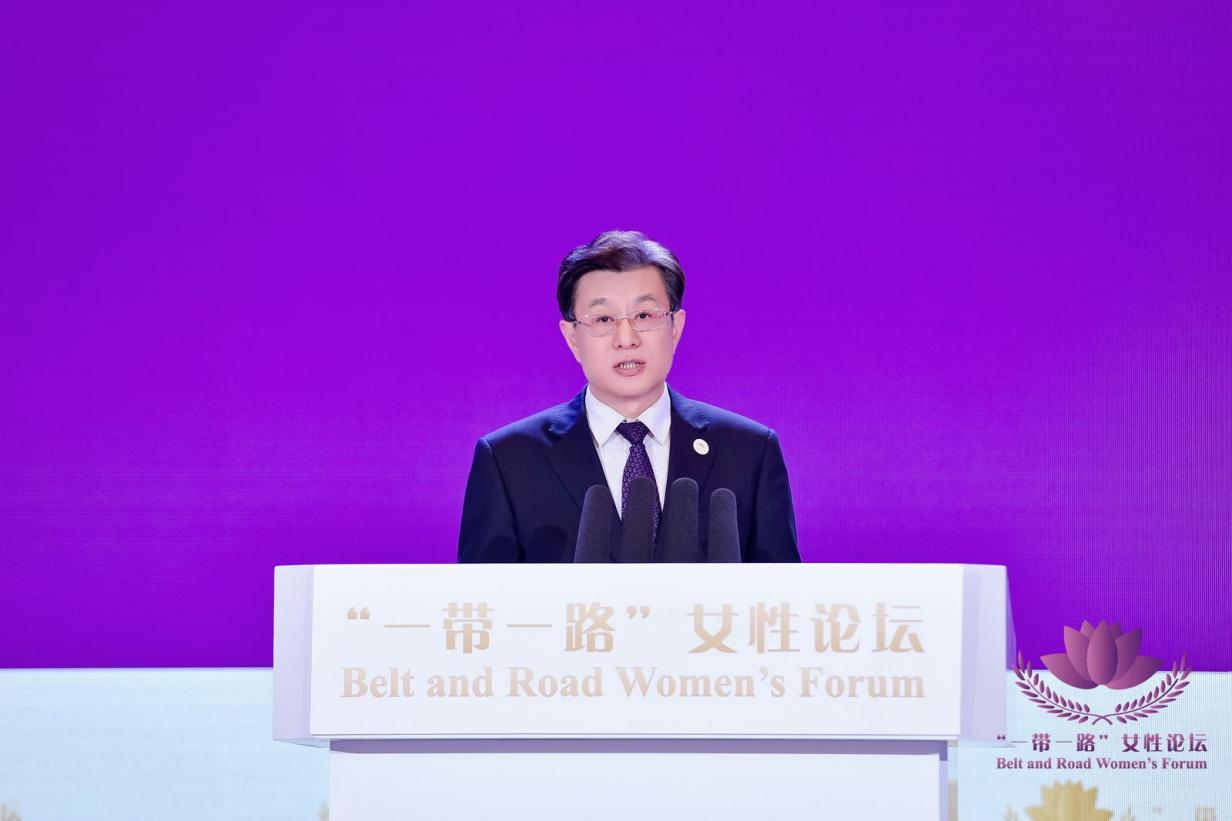
Li Xikui highlighted the increasingly important role of women as participants in economic development, especially within the Belt and Road Initiative. Their vitality and creativity in entrepreneurship, innovation, and technology are injecting new energy into global prosperity. Women’s contributions, characterized by constant innovation across various industries, are indispensable to the success of the Belt and Road Initiative.
He highlighted the unique value of the Belt and Road Women’s Forum since its inception, particularly in promoting the development of women’s affairs and fostering international friendly exchanges. He acknowledged that the forum serves as an inspiring platform that encourages more women to play active roles in various fields. This participation is crucial for expanding the scope of the Belt and Road Initiative, contributing significantly to its development. Li Xikui emphasized that women’s increased involvement and contribution of their wisdom and strength are pivotal in driving the success and expansion of the Belt and Road Initiative.
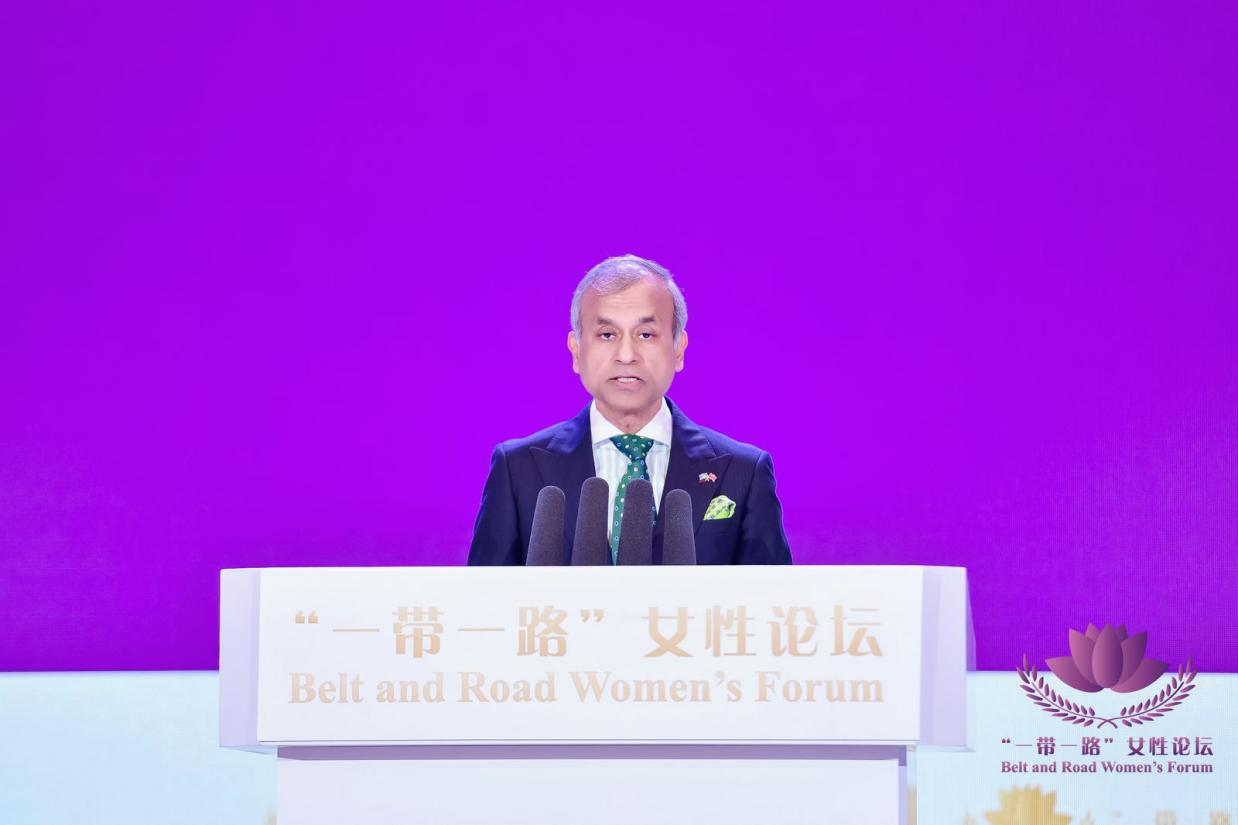
Siddharth Chatterjee, the United Nations Resident Coordinator in China, focused on Sustainable Development Goal 5, emphasizing gender equality and women’s economic empowerment. He noted that reducing gender-based inequalities accelerates economic and social development. He praised women’s transformative leadership styles for boosting productivity and cited China’s achievements in poverty alleviation and women’s equality over the past 40 years, particularly in STEM fields. He provided effective action recommendations from political will, public policy, and public-private partnerships perspectives.
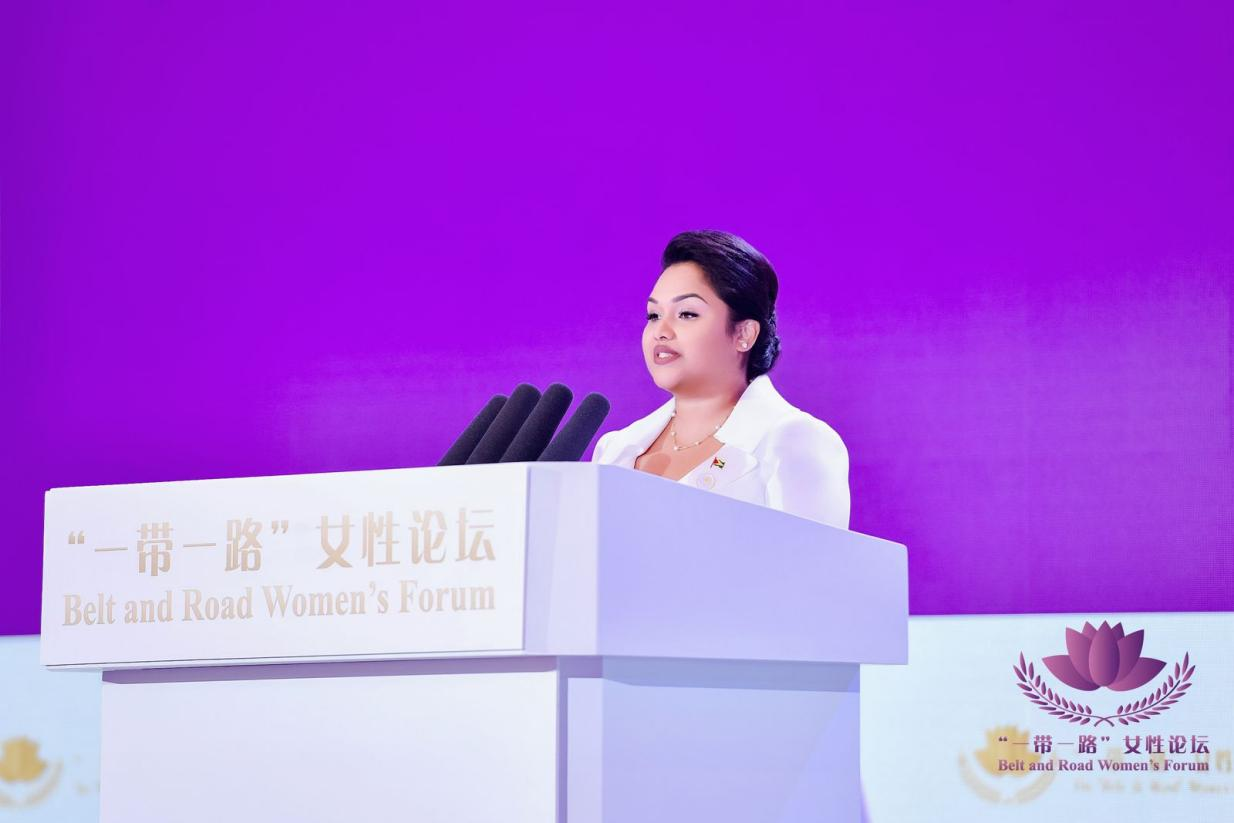
Arya Ali viewed the Belt and Road Initiative as a new phase of globalization. Spearheaded by the People’s Republic of China, it has led to unprecedented infrastructure development, enhanced connectivity, and increased cooperation among participating countries. The initiative not only fosters economic growth but also significantly empowers women by expanding their opportunities and access to markets and resources. Women have become actively involved in the socio-economic transformations driven by the initiative and contributed to its success.
Over the past decade since the Belt and Road Initiative was proposed, the collaboration and exchange among women from participating countries have become a vital part of fostering mutual understanding and collective development. Under the preside of Yi Chao, Deputy Director of the Public Welfare Service Center, All-China Federation of Returned Overseas Chinese, distinguished guests including Ing Kantha Phavi, Minister of Women’s Affairs, Cambodian; Ergoge Tesfaye, Minister of Women and Social Affairs of the Federal Democratic Republic of Ethiopia; Iven Zyuulu, Ambassador of Zambia to China; Musaeva Aktilek, Ambassador of Kyrgyzstan to China; Pansy Ho Chiu-king, Member of the Standing Committee of the National Committee of the Chinese People’s Political Consultative Conference, Member of Standing Committee of The All-China Women’s Federation, President of Hong Kong Federation of Women; Chan Laiwa, Chairwoman of the Board, Fu Wah International Group, Curator of China Red Sandalwood Museum; He Dan, Member of the 14th CPPCC National Committee, Member of the Committee on Population, Resources and Environment; Zhang Ronghua, Deputy to the National People’s Congress, President of Women Entrepreneurs’ Chamber of Commerce, All-China Federation of Industry and Commerce, Chairman of the Board, Rochcheck Group; Li Qingchuan, Deputy General Manager of Dong-E-E-Jiao Co., Ltd.; Xue Baojin, Honorary President of The Singapore Chamber of Commerce and Industry in China, President of the Singapore China Friendship Association; and Wang Wenchang, Party Secretary of Committee, Hainan Station of China Media Group, shared their experiences and viewpoints in a keynote speech titled ‘Women’s Exchanges and Cooperation under the Belt and Road Initiative to Enhance People-to-People Connectivity’
Ing Kantha Phavi stated that Cambodia is one of the first countries to endorse China’s Belt and Road Initiative, serving as a successful model in this international cooperation and development framework. The initiative has brought new development opportunities to Cambodia, enabling unprecedented mutual benefits through practical cooperation in various fields. Under this initiative, Cambodia has seen significant economic growth and prosperity, creating an environment conducive for the government to increase social development investments and implement more policies and plans related to gender equality.
Ergoge Tesfaye observed that the long-standing bilateral cooperation between Ethiopia and China has strengthened over time. Since the launch of the Belt and Road Initiative in 2013, Ethiopia has been a model beneficiary in Africa, successfully undertaking large-scale projects in infrastructure, energy, transportation, industry, and commerce. The initiative's significant contributions to Ethiopia's economic development are evident and widely recognized.
Iven Zyuulu stated that the Belt and Road Initiative provides a historic opportunity to reshape the global economic landscape. In this endeavor, women’s participation and rights are not just a matter of equality but are foundational to the success and sustainable development of the initiative. It’s crucial to ensure that we continue on a path of equitable and prosperous development.
Musaeva Aktilek highlighted the significant contributions of Kyrgyzstani women to the nation’s development and prosperity. Without their active participation, it would be challenging to expect political engagement and the enhancement of multicultural people’s values, while maintaining the excellent qualities of the society’s character. The Mother and Child Community Support Foundation, led by the First Lady of Kyrgyzstan, plays a key role in helping children and mothers improve their quality of life and protect their rights, operating in various areas including education, health, economic welfare, ecological culture, and human rights.
Ho Chiu-king noted that the Belt and Road Women’s Forum, now in its fifth session, has provided a platform for women representatives from participating countries. Their involvement has made the forum down-to-earth, connected hearts and minds, and contributed to women’s causes along the Belt and Road, uniting a cross-regional, cross-cultural, and cross-disciplinary ‘She Power.’ Hong Kong and Macau, as special administrative regions of China under the ‘One Country, Two Systems’ principle, play a key role as gateways for the nation to the world. Civil organizations in these regions actively build international platforms and connect with people from countries along the Belt and Road.
Chan Laiwa reflected on the innate love of beauty, delicate emotions, gentle nature, communication skills, and keen perception of women. These traits enable women to leverage their strengths in various fields, significantly contributing to the Belt and Road Initiative and fostering ‘People-to-People Connectivity’.
He Dan emphasized that promoting gender equality is a long-term endeavor requiring the joint efforts of all sectors of society and international cooperation and exchange. Believing in the power of gender equality to reach endless possibilities, a world where half of its population, women, are integrated into the global development wave will welcome a more just, beautiful, inclusive, and sustainable future.
Zhang Ronghua emphasized the importance of virtue and beauty in the global context. She highlighted the growing influence of women’s power, wisdom, and spirit in shaping the world.
Li Qingchuan, representing Dong-E-E-Jiao, a key participant in the Belt and Road Initiative, pledged to deepen health sector collaboration between China and other participating countries. The focus is on mutual learning and pooling resources to ensure continuous advancements in women’s health globally, disseminating the essence of traditional Chinese medicine, and enhancing its international influence and development level.
Xue Baojin remarked that this year marks the tenth anniversary of the Belt and Road Initiative. The evolving partnership between Singapore and China has significantly contributed to the initiative’s progress. Singapore, being China’s largest foreign investment source and largest trading partner, has seen its relationship with China upgrade to a comprehensive, high-quality, and all-encompassing partnership, making Singapore a key player in the Belt and Road Initiative. Together, the two nations aim to co-author a new chapter in their economic growth.
Wang Wenchang expressed a forward-looking perspective on the Belt and Road Initiative, emphasizing the crucial role of women’s empowerment in shaping its future. He underscored the theme ‘She Power: Jointly Building and Sharing a Beautiful Life,’ advocating for women’s active involvement in fostering the collective development and prosperity of human society under the Belt and Road Initiative. Wang also highlighted the China Media Group’s focused coverage of the Belt and Road Initiative, drawing attention to the stories of frontline workers and builders from Africa, Asia, and around the world, many of whom are women. This coverage reflects the diverse and essential contributions of women in various roles and sectors, highlighting their significant impact on global development projects, including those under the Belt and Road Initiative. Wang's remarks underscore the importance of recognizing and amplifying the contributions of women, which are vital for achieving inclusive growth and sustainable development in the global community.
At the theme forum 1 titled ‘Sci-Technology Empowers a Beautiful World,’ speakers such as Yan Jiangying, Chairperson of China Association of Fragrance Flavour and Cosmetic Industries; Zhao Li, Director of Fu Wah International Group, Chairwoman of the Board of LICIWAH; and Nobel Laureate Michael Houghton discussed how technological advancements have transformed daily life and beautified the world. Women scientists, scholars, and entrepreneurs have made significant achievements in industries like cosmetics, fashion, and biotechnology, contributing to high-quality economic development and adding color to the world.
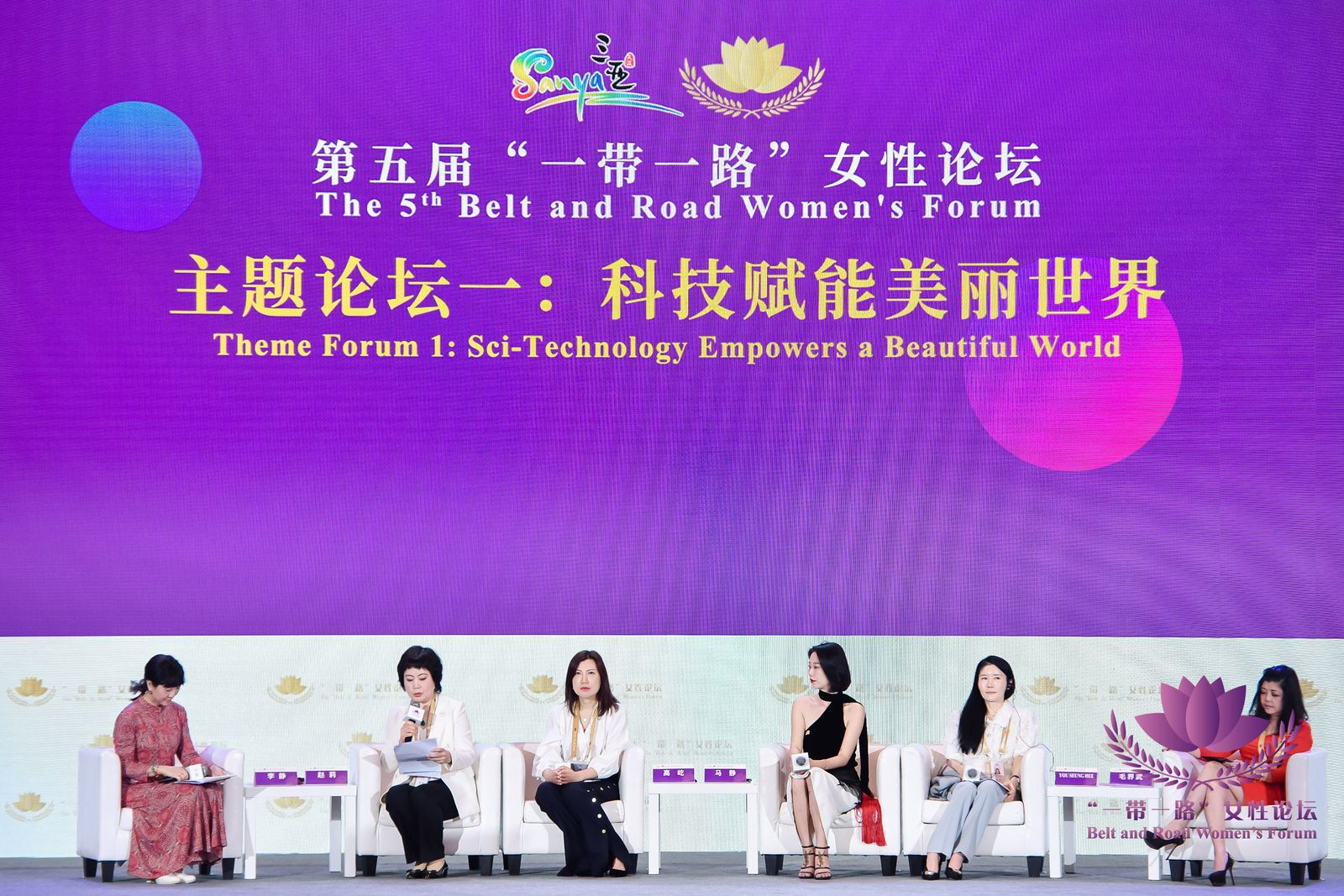
Yan Jiangying pointed out that ‘She Power’ manifests in various forms, including innovation, technology, craftsmanship, leadership, global reach, communication, education, and compliance, all contributing to high-quality development in our lives.
Zhao Li reflected on the achievements of the Belt and Road Initiative over the past decade, noting its role in creating pathways of happiness and prosperity for countries worldwide. The initiative has connected roads, hearts, people, and dreams, changing countless lives and destinies.
Michael Houghton emphasized the importance of cross-border cooperation and the essential role of women in shaping the future. He expressed his delight in participating in the 5th Belt and Road Women’s Forum, wishing for its success in creating a better future for both women and men.
In theme forum 2, ‘Promoting Gender Equality and Health for All, Building a Society Friendly to Family,’ prominent figures such as Du Jie, Director of Women’s Studies Institute of China; Maria Gustava, the Ambassador of The Republic of Mozambique to China; Hong Yuji, Vice President of Hong Kong Federation of Women; Shen Mei, Level I Bureau Rank Official of Jiangsu Women’s Federation; President of Jiangsu Family Education Research Association; Shi Huimin, Vice President of Hebei Women’s Federation; Roberta Lipson, Founder of United Family Healthcare; and Nadia Benani, Counsellor of International Cooperation Division, Embassy of Swiss Confederation in China; engaged in comprehensive discussions. They explored themes surrounding gender equality and the cultivation of a family-friendly society.
These discussions underscored the notion that families are the fundamental units of society, with their well-being and vitality being crucial to societal harmony and strength. The participants stressed the role of society as a facilitator of family happiness, where family consciousness and friendly interactions are pivotal for the stability and development of millions of families.
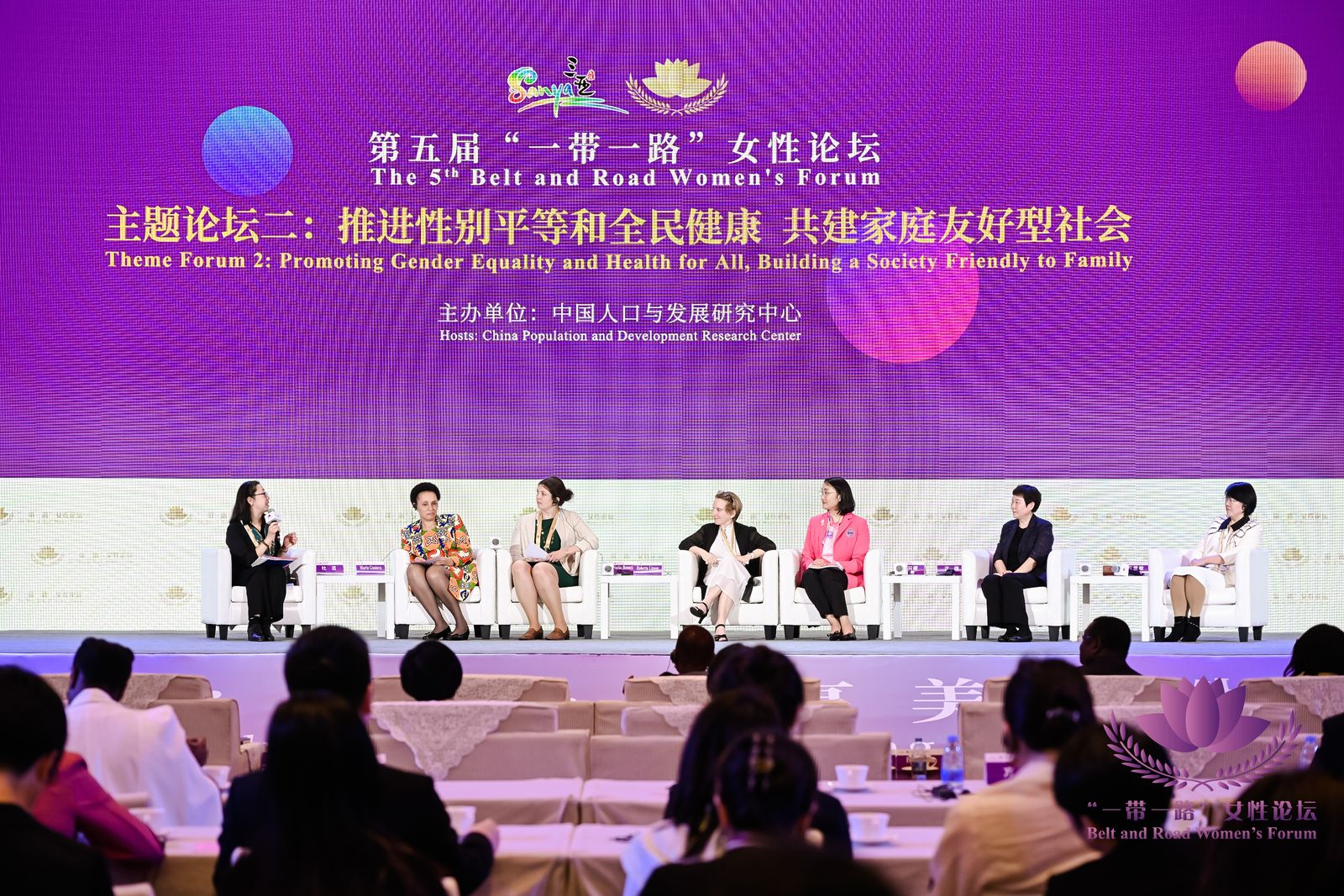
Through their in-depth dialogues and sharing, these leaders contributed valuable perspectives on advancing gender equality and fostering environments where families can thrive. Their insights highlight the importance of creating supportive societal structures that nurture family well-being, demonstrating the interconnectedness of family health and societal prosperity.
Maria Gustava emphasized the critical role of promoting gender equality and overall health in building an inclusive society that fosters harmony and sustainable development. She highlighted the importance of making the role of women in families and communities not just an aspiration but a reality, to create a more equitable and prosperous society.
Hong Yuyan discussed the increasing role of professional women in Hong Kong, especially in contributing to the development of the city and its participation in the Belt and Road Initiative. She noted the growing economic cooperation and legal disputes, suggesting Hong Kong’s unique legal system as a strategic advantage to establish an international dispute resolution center.
Shen Mei narrated stories exemplifying fathers engaged in various activities, underlining the need for gender equality and overall health to build a family-friendly society.
Shi Huimin stressed the significance of families in national prosperity and ethnic rejuvenation, advocating for a collective effort to focus on and address family needs in building a family-friendly society.
Roberta Lipson talked about United Family Healthcare’s contribution to China, particularly in integrating international healthcare concepts and methods into women’s health.
Nadia Benani from the Swiss Embassy discussed the importance of unpaid care work in advancing gender equality, in line with the United Nations Millennium Development Goals and Sustainable Development Goals.
Du Jie highlighted gender equality as a vital indicator of a nation's and the world’s developmental and civilizational progress. She noted that the Belt and Road Initiative provides a new platform for advancing gender equality.

At the theme forum 3, ‘Deepening Cultural Exchanges and Promoting Mutual Learning,’ led by Zhang Xihai, Level I Bureau Rank Official of the Department of International Liaison, China Federation of Literary and Art Circles; speakers like Oliver Wonekha, Ugandan Ambassador to China, Yang Yunxia of Chief Engineer of Wuliangye Yibin Co., Ltd.; and Suraya Pauzi, Consul General of Malaysia in Guangzhou, spoke about the importance of cultural exchange. They emphasized using culture to convey ideas, spread messages, and educate people, helping the world understand China and contributing to the construction of a modern socialist country and the great rejuvenation of the Chinese nation.
Oliver Wonekha highlighted the essential role of cultural diplomacy in strengthening Uganda-China bilateral relations. Through cultural exchanges, mutual understanding and appreciation of each culture are enhanced, laying a solid foundation for cooperation across various fields. Cultural diplomacy thus builds trust, promotes dialogue, and finds common ground in addressing shared challenges and goals.
Yang Yunxia expressed her views on the integration of Chinese liquor culture with global liquor traditions. As part of Wuliangye’s vision, there’s an aspiration to share the ‘harmonious and beautiful culture’ of Chinese liquor with the world. The goal is to celebrate the diversity and unique beauty of various alcoholic beverages globally, fostering a harmonious and shared cultural landscape. Yang hopes for different nations and peoples to embrace the joy of sharing drinks, singing over wine, and using it as a medium for business and cultural exchange, enhancing mutual understanding and respect between different liquor cultures.
Suraya Pauzi reflected on the deep-rooted and constructive relationship between Malaysia and China, particularly in the context of the Belt and Road Initiative. She emphasized the pivotal role of this initiative in strengthening the connectivity and mutual understanding between Malaysia and China, highlighting the beneficial impact of this collaboration on both nations.
2023 marks the tenth anniversary of the Belt and Road Initiative. Over the past decade, the Belt and Road Women’s Forum has played a crucial role in highlighting the unique contributions of women to the development of the Belt and Road Initiative. It has significantly promoted the comprehensive and sustainable development of women and fostered people-to-people connections among the participating countries. The forum has established a platform for communication and exchange among women across the Belt and Road countries, building bridges for better understanding and cooperation.
